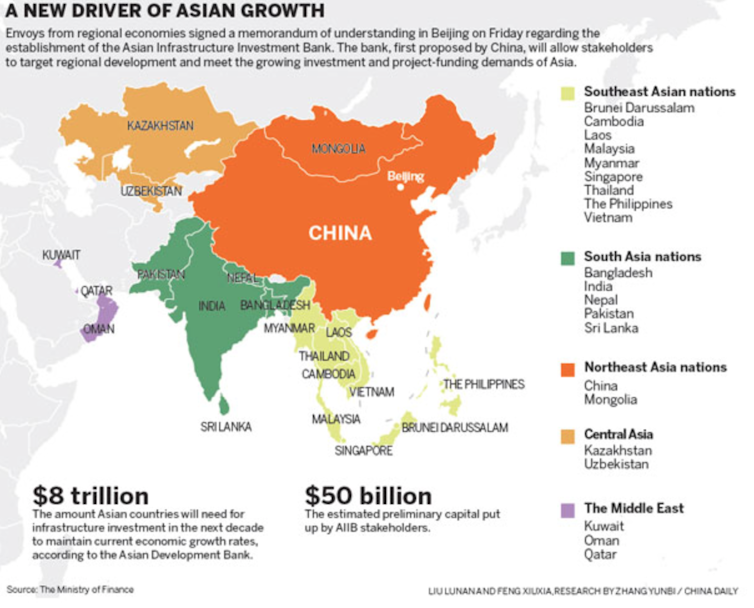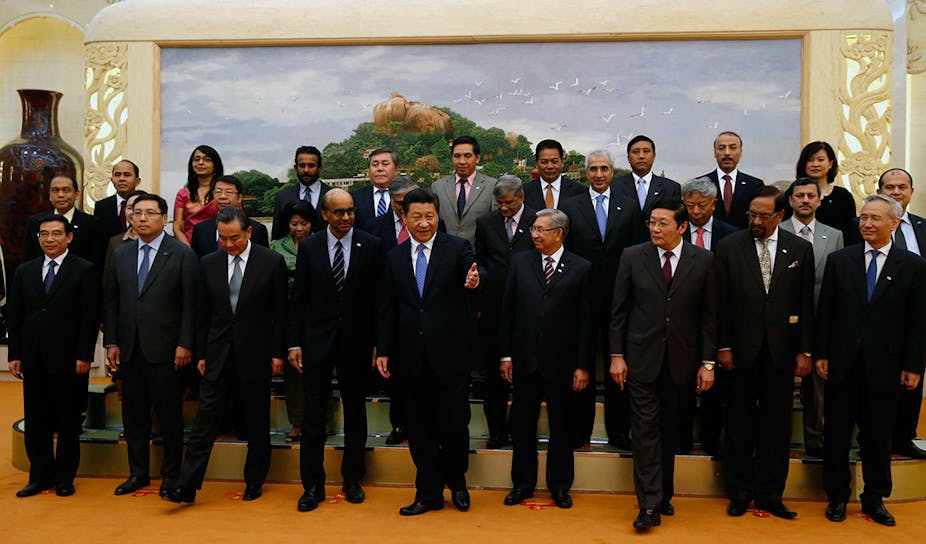In an influential speech in 2005, then-US deputy secretary of state Robert Zoellick called on China to become a “responsible stakeholder” in the international community. To optimists, China’s recent efforts in creating high-profile international development banks shows that it is gradually embracing that role.
China signed an agreement in July with the four other BRICS countries – Brazil, Russia, India and South Africa – to create the New Development Bank (NDB) to provide loans and liquidity to member nations. Just three months later, Beijing pioneered the effort to create an Asian Infrastructure Investment Bank (AIIB) to finance development projects in the region. Twenty-one nations as diverse as Qatar, India, Singapore, Thailand and most recently Indonesia signed on as founding members. China plans to provide the majority of the capital required to finance the new bank’s operations, with the headquarters located in Beijing.
The US and its allies view the China-backed AIIB with deep suspicion. It is an open secret that Washington has successfully pressured Australia and South Korea to refrain from joining the new development bank. What explains such hostility toward the Chinese effort to take a larger role in regional and global governance?
The US$8 trillion gap
After all, there will be an US$8 trillion infrastructure investment gap in Asia and the Pacific in the next 10 years, or US$800 billion each year. The Asian Development Bank (ADB), the leading such lender in the region, only grants US$13 billion of new loans each year. The AIIB has the potential to help address this huge investment gap. Officially, skeptics of the AIIB focus on the issue of governance (that is, a concern that AIIB loans will not be tied to improvements in labor and environmental standards) when asked to explain their reservations toward the new mega-bank.
This is not the only reason, however. To understand why the creation of the new China-backed international mega-bank is so disconcerting to many, we need to examine the four international political consequences associated with the creation of the AIIB.

China’s economic statecraft
First, the AIIB can strengthen Beijing’s economic influence in Asia, which can then be leveraged to affect the foreign policies of nations in the region. Beijing has a long history of relying on its economic clout to further its international political objectives. In 2012, then-Chinese President Hu Jintao visited Cambodia’s Prime Minister Hun Sen and signed a series of bilateral trade and aid agreements right before the ASEAN summit that year. During the summit, the ASEAN nations failed to issue a common communique – which is unprecedented – due to Cambodia’s unwillingness to include any statement that might embarrass China. The list goes on.
That same year, China restricted banana imports from the Philippines in response to the two nations’ naval stand-off over the Scarborough Shoals. In 2011, China stopped shipments of rare earth metals to Japan in response to its dispute over the Diaoyu/Senkaku Islands. It’s possible that Beijing would leverage its influence in the AIIB to entice developing member nations to support its foreign policy agenda.
Second, creating the AIIB undermines Japanese and American influence in Asia. Recent studies by Dreher et. al (2009) and Lim and Vreeland (2013) suggest that the US and Japan use their influence in the World Bank and ADB to reward their political allies in the region. By setting up the AIIB, Beijing provides an alternative source of loans for developing nations in Asia, thereby reducing the US’s and Japan’s abilities to leverage IMF and ADB loans to entice nations to support their own foreign policy initiatives. Unsurprisingly, Japan was not even invited to sign the memorandum of understanding for the AIIB.
Third, the creation of the AIIB places pressure on the Western powers and Japan to revamp the governance structures of the IMF, the World Bank and the ADB. Despite China’s growing economic clout, it is accorded little influence in these cornerstone international and regional financial institutions. China’s share of the vote in the IMF, for instance, is only one fourth of the US’s. Beijing’s backing of the AIIB sends a strong signal to the Western powers and Japan that China has outside options if existing multilateral arrangements do not evolve to reflect China’s rising economic and political influence.
Lastly, the creation of the AIIB provides an opportunity for Beijing to assess which nations in the region can be co-opted or pressured into supporting its foreign policy agenda (at least on the surface). A nation’s refusal to participate in the AIIB sends a strong signal to the Chinese leadership that: (1) it is a staunch US ally that requires more carrots and sticks to make it susceptible to Chinese influence; (2) it has doubts about China’s growing influence in the region. Of course, subscribing to the AIIB does not mean that a nation is an ally of China (for example, the Philippines and Vietnam), but it does signify at least superficial acceptance of Chinese leadership in Asia.
From biding time to great power diplomacy
Will Asia benefit from the creation of the AIIB? Most commentators have focused on explicating how AIIB loans – which are expected to be provided with little or no conditions attached – may initiate a race to the bottom among international financial institutions with regards to loan-making. This, however, is unlikely to happen given the huge infrastructure investment gap in Asia. Developing nations in the region need loans more than the international financial institutions need business. The creation of the AIIB does, however, signal an important shift in Chinese grand strategy that may create a more conflict-ridden Asia in the coming years.
Just ten years ago, it would be impossible to imagine that Beijing would take the lead in creating high-profile international institutions like the NDB and the AIIB. Under the slogan “conceal one’s strengths and bide one’s time” (taoguang yanghui), which succinctly summarizes Chinese grand strategy since Deng Xiaoping, Chinese diplomacy has been reactive and passive. This is no longer the case. The buzz word in the Chinese foreign policy circle these days is “great power diplomacy” (daguo waijiao), a term that highlights China’s growing confidence as the pre-eminent great power, second only to the US. The creation of the AIIB should be understood in the context of a paradigm shift in Chinese grand strategy.

